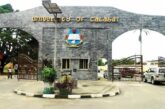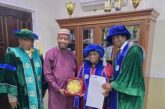
Twenty-three-year-old Oluwatobiloba Osedimilehin from Owo, Ondo State, recently graduated with first-class honours in Cell Biology and Genetics from the University of Lagos. He shares the story of his achievement with TEMITOPE ADETUNJI
What year did you gain admission?
My name is Oluwatobiloba Johnson Osedimilehin. I am 23 years old. I hail from Owo, Ondo State. I gained admission in 2017.
How do you feel about achieving first-class honours in Cell Biology and Genetics?
It’s a wonderful feeling to have graduated from such a prestigious university with a CGPA of 4.93 and as the best student in the Faculty of Science. I had many wonderful experiences. I made a few great friends along the way. I was able to represent my department in a competition organised by Inqaba Biotec. I attended a conference on forensics hosted by my department. I also took part in Health Safety and Environment training. I left my shell and became a ‘new’ person in a sense because I was very introverted during my secondary school days.
Can you share some of the key experiences and challenges you encountered during your academic journey at UNILAG?
As for the challenges I faced, I had to wait at home for a month because my name was on the supplementary admission list, and when my name finally came out and I resumed, I was a month behind. So I had to attend tutorials to catch up. I had issues with accommodation in my first year, but I found a way around it. My final year project was a bit challenging too, but God took control and helped me with it.
What year did you graduate?
I graduated on October 25, 2023, and the convocation was on January 16, 2024.
What sparked your interest in Cell Biology and Genetics, and how did your passion evolve throughout your study?
I initially wanted to study Medicine, but I didn’t get enough points, so I was offered Cell Biology and Genetics. I would say I have come to develop an appreciation for it, and I am glad that I decided to do it.
Can you discuss any research projects or academic initiatives you were involved in during your time at the University of Lagos?
I took on a project that was an attempt to clone the gene of the Chitinase enzyme in the African palm weevil. The Chitinase enzyme is very useful in waste disposal, control of agricultural pests, and healthcare.
How do you envision applying your knowledge and skills in Cell Biology and Genetics to real-world issues and scientific advancement?
I am interested in computer-aided drug design because of its usefulness in the real world. It is relevant in the sense that it can help with understanding the structure of a compound and its biological activity. Computer-aided drug design can also play a role in identifying potential drug targets.
What are some of the emerging trends or breakthroughs in the field of Cell Biology and Genetics that excite you the most?
I am excited about computer-aided drug design, which I mentioned earlier, as well as gene editing with CRISPR and its boundless potential. I am also excited about progress in stem cell research.
How do you plan to contribute to the scientific community and promote further understanding in your area of expertise?
Because I am working towards a career in Bioinformatics, I intend to attend conferences, make presentations at conferences, publish research papers, and collaborate with others in the field.
Can you elaborate on any internships, co-op experiences, or industry placements you participated in to gain practical experience in your field?
I interned at the Cell Culture Laboratory at the University of Lagos at the end of my second year. That was where I saw and worked with cancer cells. I also underwent industrial training at the Nigerian Institute of Medical Research at the end of my third year. I worked on the extraction of genetic materials from different cell samples.
As a first-class graduate, what advice would you give to current students aspiring to excel in the field of Cell Biology and Genetics?
Study hard, read journals, and apply for internships. In essence, excelling in the field of Cell Biology and Genetics requires a combination of academic dedication, intellectual curiosity, practical experience, and a supportive network. By embracing these principles and actively engaging with the multifaceted aspects of the discipline, you’ll not only excel academically but also contribute meaningfully to the advancement of scientific knowledge and innovation in the field.
How did you feel when you saw your result, and what were your parents’ reactions?
When I saw my result, I was thrilled. It was like all the hard work I put in paid off. Seeing those grades made me smile because I knew I did well. My parents were super excited too. They were proud of me. Their faces lit up when they saw my result. It felt amazing to make them happy and show them that their support meant a lot to me. It was a special moment we shared, full of joy and love.
How do your parents show you their support?
My parents were the ones financing my academics right from the start. My dad struggled to help me get through the university. My mum supports me with prayers and kind words. The two of them were my backbone while I was in school, always checking in on me, and letting me know they were always proud of me. I owe my success to them.
How do you plan to stay updated with the latest developments and research findings in your field after graduating from the university?
By reading journals, attending webinars, and taking online courses. I also plan to join professional bodies in the field.
What are the things that helped you achieve first-class?
Achieving a first-class degree is a big accomplishment, and there were a few things that helped me get there. One of the main things was how much I read. Whenever I felt like I needed to read, I did it. I didn’t stay up super late to study because I’m not a night owl, but I made sure to use my daytime hours effectively. The library was like my second home. I spent a lot of time there, surrounded by books and resources. It’s amazing how much one can learn just by being in that environment. Attending tutorials in my first and second years was super helpful too. Tutorials are like small group classes where you can ask questions and get extra help to understand things. So, in short, reading regularly, using my time wisely during the day, making good use of the library, and attending tutorials were the main things that helped me achieve a first-class degree. It took dedication and hard work, but it was worth it in the end.
What leadership roles or extracurricular activities were you involved in during your time at the University of Lagos and how they contributed to your personal and professional growth?
I was a class executive from my second year till I graduated. I was one of those in charge of representing the class and organising tutorials for members of the class. In my final year, I was the head of the technical committee during our oral seminal presentations. I was a member of the welfare committee during the first edition of Prof Ogundipe’s Innovative Competition. These roles helped me interact better with people and taught me the essence of responsibility.
What are some of the biggest challenges facing the field of Cell Biology and Genetics today, and how can they be addressed?
I would say funding is an issue, especially when we talk about the field of tertiary institutions. There are lots of projects that can be done and novel discoveries waiting to be made if only there is support for students who are doing project research and seasoned researchers.
How do you plan to leverage your academic achievements and expertise to pursue further education or career opportunities in your chosen field?
I am currently in pursuit of scholarships. I intend to do my PhD in Bioinformatics and I’m looking out for scholarships that can help me achieve this goal. I am taking online courses to prepare me for the real deal. I am also very much open to internships that will give me experience.
Can you share any memorable experiences or breakthrough moments from your time studying Cell Biology and Genetics at the University of Lagos?
In the six semesters, I had 5.0 GPAs. I was glad because my efforts yielded fruit. Also, when I won a laptop because I was the best student at the tutorial I attended. I also got to attend and win a prize at the Inqaba Biotec event held in my school in my final year. My seminar presentation and project defence days were memorable ones for me. I remember the day my course mates and I went to the beach in my final year. We had fun as a group. My final-year week was fun.
Did you receive any awards from the school?
Yes, I did. I received a total of five awards on graduation day. They are the Gocuz Group Limited prize for the best student, the best-graduating student in the Faculty of Science, the HOD’s prize for the best all-round performance at the degree level in the Department of Cell Biology and Genetics, the Nordica Fertility Centre Prize for the best graduating student in the Department of Cell Biology and Genetics, the Dean’s prize for the best all-round performance at the degree level in the Faculty of Science, and the Kayode Bewaji Foundation prize for the best-graduating student in the Faculty of Science. I also received the Gocuz Group Limited prize for the best 200-level student in the Faculty of Science at the end of my second year and the same at the end of my third year.
What do you hope to accomplish in your career within the next five years, and how do you plan to achieve those goals?
I see myself as a bioinformatician with significant research under my belt. I hope to make contributions to the field in the aspect of drug design and drug discovery.
Do you plan to give back to your alma mater and contribute to the development of future generations of Cell Biology and Genetics students?
I intend to establish a foundation that will sponsor students of Cell Biology and Genetics, especially the outstanding ones. By doing this, I hope to make it easier for talented students to pursue their dreams in these fields. I believe that investing in their education will not only benefit them but also contribute to the future of Cell Biology and Genetics. It’s a way of saying thank you to my alma mater and helping to shape the next generation of scientists.
Credit: Punchng




